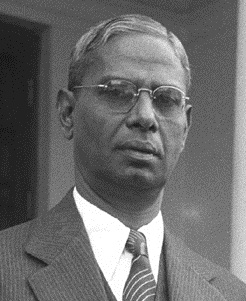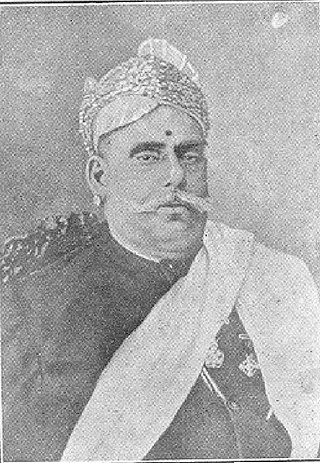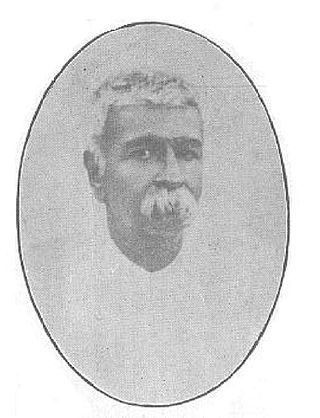
The Most Eminent Order of the Indian Empire is an order of chivalry founded by Queen Victoria on 1 January 1878. The Order includes members of three classes:
- Knight Grand Commander (GCIE)
- Knight Commander (KCIE)
- Companion (CIE)

Dewan Bahadur Sachivottama SirChetput Pattabhiraman Ramaswami Iyer, popularly known as Sir C. P., was an Indian lawyer, administrator and statesman, acknowledged as the most powerful man in the Madras Presidency in the decades immediately prior to Indian Independence.

Sir Ramasamy Chetty Kandasamy Shanmukham ChettyKCIE was an Indian lawyer, economist and politician who served as first Finance Minister of India from 1947 to 1948. He also served as President of India's Central Legislative Assembly from 1933 to 1935 and Diwan of Cochin kingdom from 1935 to 1941.
Diwan Bahadur Agaram Subbarayalu Reddiar was a landlord and Prime Minister or Premier of Madras Presidency from 17 December 1920 to 11 July 1921.

Rao Bahadur Sir Vangal Thiruvenkatachari KrishnamachariKCSI, KCIE was an Indian civil servant and administrator. He served as the Diwan of Baroda from 1927 to 1944, Prime Minister of Jaipur State from 1946 to 1949 and as a member of the Rajya Sabha from 1961 to 1964.

Sir Pazhamaneri Sundaram Sivaswami Iyer was a prominent lawyer, administrator and statesman who served as the Advocate General of Madras from 1907 to 1911.

Diwan Bahadur SirVembakkam Bhashyam Aiyangar was a lawyer and jurist who served as the first Indian Advocate-General of the Madras Presidency and later, as a Justice of the High Court of Madras. As a Vakil he was the undisputed leader of the Madras bar, and, in his heyday, described as the 'greatest jurist in India'.
Diwan Bahadur Rishiyur Venkata Srinivasa Aiyar was an Indian civil servant, legislator and politician from the Madras Presidency.
Diwan Bahadur Sakkottai Krishnaswamy Aiyangar was an Indian historian, academician and Dravidologist. He chaired the Department of Indian History and Archaeology at the University of Madras from 1914 to 1929.

Kalpathi Ramakrishna Ramanathan was an Indian physicist and meteorologist. He was the first Director of Physical Research Laboratory, Ahmedabad. From 1954 to 1957, Ramanathan was President of the International Union of Geodesy and Geophysics (IUGG). Ramanathan was awarded Padma Bhushan in 1965 and Padma Vibhushan in 1976.
Diwan Bahadur Lewis Dominic Swamikannu PillaiCIE, ISO was an Indian politician, historian, linguist, astronomer and administrator who served as the second President of the Madras Legislative Council.
Diwan Bahadur Sir Mannath Krishnan NairKCIE (1870–1938) was an Indian politician from the Indian National Congress and later, Justice Party who served as a member of the Madras Legislative Council and later, executive council of the Governor of Madras. He also served as the Chief Justice of Travancore High Court and later Diwan of Travancore from 1914 to 1920(?)

Tanjore Rama Rao, was an Indian administrator who served as the Diwan of Travancore from 1887 to 1892. V. Nagam Aiya, in his 1906 Travancore State Manual calls him "the most popular Diwan in recent times". Rama Rao was a cousin of Rajah Sir T. Madhava Rao and Diwan Bahadur R. Raghunatha Rao. All three were grandsons of Gundopanth. Rama Rao's mother Sonamma Bai was Gundopanth's daughter, while Diwan Bahadur R. Raghunatha Rao's father R. Venkata Rao and T. Madhava Rao's father R. Ranga Rao were Gundopanth's sons.

Diwan Bahadur Raghunatha Rao Ramachandra Rao was an Indian civil servant, mathematician and social and political activist who served as District Collector in British India. He was a member of the Mylapore clique.

Diwan BahadurSir Calamur Viravalli Kumaraswami Sastri was an Indian jurist, statesman, and Sanskrit scholar who was leader of the Madras Bar as a Vakil of the High Court, before being appointed as a puisne justice of the Madras High Court in 1914, and, later, Chief Justice of the Madras High Court. He also served on numerous special committees; most notoriously, the Rowlatt Committee - service on which nearly imperiled his later service as Chief Justice. The great-grandson, great-great-grandson, and great-great-greatgrandson of celebrated Sanskritists, he himself was noted for achieving "brilliant success, with speed" from his first days practicing law. In his heyday, he was considered "the most brilliant representative of the Madras Judicial Service", and the successor to V. Bhashyam Aiyangar.

Diwan Bahadur Sir Narasimha Gopalaswami Ayyangar was an Indian civil servant and statesman, who served as the Prime Minister of the princely state of Jammu and Kashmir and later a minister in the first cabinet of independent India. He was a member of the drafting committee of the Constitution of India, the leader of the Rajya Sabha, a 'minister without portfolio' looking after Kashmir Affairs, and the Minister for Railways.
Diwan Bahadur Jannyavula Venkatanarayana Rao NaiduCIE (1870–1955) was an Indian civil servant, writer and politician who served as Commissioner of Madras city from 1925 to 1928.

Dewan Bahadur or Diwan Bahadur was a title of honour awarded during British rule in India. It was awarded to individuals who had performed faithful service or acts of public welfare to the nation. From 1911 the title was accompanied by a special Title Badge. Dewan literally means Prime Minister in Indian context and Bahadur means brave.
The New Year Honours 1907 were appointments by Edward VII to various orders and honours to reward and highlight good works by members of the British Empire. They were published on 1 January 1907.
The 1911 Delhi Durbar was held in December 1911 following the coronation in London in June of that year of King George V and Queen Mary. The King and Queen travelled to Delhi for the Durbar. For the occasion, the statutory limits of the membership of the Order of the Star of India and the Order of the Indian Empire were increased and many appointments were made to these and other orders. These honours were published in a supplement to the London Gazette dated 8 December 1911.











